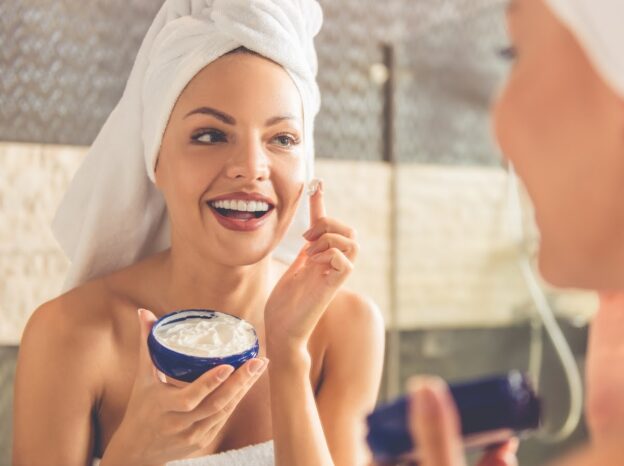Base Tans & Other Myths About Tanning, Sunburns, & Skin Cancer

With beach vacations, long days by the pool, ball games, and barbecues, summer is a favorite time of year for many of us. It also happens to be a particularly dangerous time for your skin. Given that just a few serious sunburns in your lifetime can significantly increase the risk of developing skin cancer, taking summer skin care seriously is essential.
Unfortunately, misinformation runs rampant about what really works when it comes to safe tanning, preventing skin cancer, and shielding against sunburn, leading many to believe they are protected when, in fact, their skin remains vulnerable.
Before you step out your front door for another summer day, take a moment to read the truth about four of the most common and dangerous myths about summer skin care—and what you can do to make sure you are protected.
Myth #1: Getting a “base tan” will help protect you from sun damage for the rest of the season
The reasoning: Those who adhere to the “base tan” theory believe full exposure to the sun without sunscreen, or visiting a tanning salon to acquire an initial tan at the beginning of summer, builds a resistance to sunburn and UV damage.
The truth: While the idea of a protective tan sounds tempting, a base tan does nothing to reduce skin cancer risk. Even a “base tan” is your body’s reaction to damaged DNA in the skin cells. A substance in the skin called melanin darkens with UV exposure to prevent more damage. This means the damage accrued while attempting to build up a base tan can actually increase your risk of skin cancer.
The bottom line: Base tans do not work. Any extended sun exposure can damage your skin, no matter how tan you are. The highly concentrated UV light in a tanning bed contains not only UVB radiation, which tans the skin, but also UVA radiation, which silently invades deep into the skin, causing irreversible skin aging, sagging, and spots. Wear a broad-spectrum sunscreen daily, making sure to reapply as necessary. If you want a beach-bronzed look, your safest bet is a self-tanning cream or spray tan.
Myth #2: If you get an SPF 50+ sunscreen, you don’t have to apply as often
The reasoning: Many people believe that a sunscreen with a Sun Protection Factor (SPF) of 50 offers more than triple the protection of SPF 15 sunscreen and should last more than three times as long.
While a higher SPF does offer increased UV protection, it has nothing to do with how long that protection lasts.
The truth: While a higher SPF does offer increased UV protection, it has nothing to do with how long that protection lasts. What SPF tells you is what percentage of the sun’s UV rays are filtered out by a sunscreen, and it is not a 1:1 ratio. A product with SPF 15 will filter out approximately 93% of the UV rays, while an SPF 30 sunscreen filters about 97%. Move up to SPF 50 and that number creeps up only a little more, to 98%.
The most important things to know about sunscreen:
- Sunscreen of any SPF needs to be reapplied at least every two hours, more often if you are sweating or swimming.
- Water-resistant SPF 30 is a solid choice, when applied properly.
- Always choose a broad-spectrum sunscreen, which protects you from both UVA and UVB rays. Some products only protect from UVB rays, which are responsible for sunburn, but both types of UV radiation cause skin damage.
The bottom line: The best sunscreen is the one that you apply the right way. One of the best things you can do for your skin is to learn the right way to apply and wear sunscreen. The American Academy of Dermatology offers a good online resource to educate yourself on effective sunscreen use.
Myth #3: Wearing sunscreen prevents you from getting enough vitamin D
The reasoning: Our bodies need sunlight to manufacture vitamin D, and sunscreen blocks this mechanism, possibly leading to vitamin D deficiency.
The truth: The risks from full sun exposure greatly outweigh the benefits of a sun-sourced dose of vitamin D, especially when there are so many easily accessible sources of this nutrient. Dairy products, fish, fortified cereals, and juices are just a few options for getting your dose of vitamin D without the added risk of skin cancer. Your body can still make vitamin D from the sun’s rays that are not filtered out by sunscreen. It only takes about 10 minutes of direct sunlight for your body to produce enough vitamin D for about a week.
The bottom line: While it is true that your body does convert UV rays from the sun into vitamin D, these same UV rays cause premature aging and significantly increase your risk for developing skin cancer. If your doctor feels you are at risk for vitamin D deficiency, he or she can recommend a specific plan for you, which will likely include a high-quality supplement.
Myth #4: Having darker skin means you don’t have to worry about skin cancer
The reasoning: People with darker skin tones don’t sunburn easily, so they must have a built-in resistance to sun damage.
The truth: While those with lighter complexions are at a higher risk of developing some form of skin cancer over a lifetime, skin cancer can affect anyone. In fact, the Skin Cancer Foundation reports that long-term survival rates for melanoma are actually lower among black patients, who are often diagnosed at a later stage than lighter-skin ethnicities. This is likely because initial signs of skin cancer, such as changes in moles or development of skin lesions, are not always easily visible on darker skin and are thus not detected early.
The bottom line: Nobody is immune to skin cancer. Sun damage to skin occurs even when visible sunburns do not. We all need to be proactive about skin cancer prevention by wearing broad-spectrum sunscreen and protective clothing, performing self-examinations regularly to monitor for changes in our skin, and seeking medical care for any concerns about skin health.
It is never too soon to start taking better care of your skin. One way to make sure your skin care routine provides optimal benefit to skin health is to see a skincare professional. A board certified plastic surgeon, dermatologist, or licensed aesthetician working under physician supervision can help you develop a skincare program that works to prevent sun damage, protect your skin, and address visible effects of sun damage.
If you have any questions about skincare, feel free to give our office a call. Our skincare team at Kirby Plastic Surgery will be happy to offer personalized guidance at a consultation.


